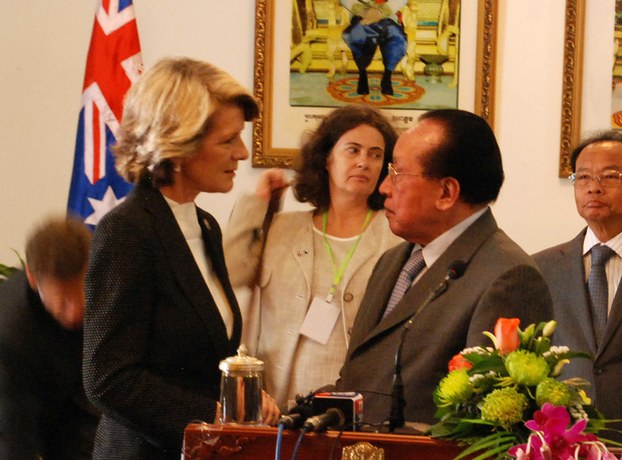




Cambodia and Australia are set to sign an agreement this week allowing refugees detained while heading for Australia to be sent instead to Cambodia, despite concerns voiced by rights groups that the impoverished Southeast Asian nation is ill-prepared to care for them.
Australian Minister of Immigration and Border Protection Scott Morrison will travel to Cambodia on Friday to sign the Memorandum of Understanding “relating to the Settlement of Refugees in Cambodia,” Cambodia’s foreign ministry said in a statement Wednesday.
The signing ceremony will be held at Cambodia’s Ministry of Interior on Friday, the statement said.
U.S.-based Human Rights Watch (HRW) Asian division director Phil Robertson slammed the move.
“We think that ultimately Australia is playing a game by trying to rid itself of certain refugees that it finds undesirable, and that they are dumping them on Cambodia,” Robertson told RFA’s Khmer Service on Wednesday.
“We don’t have a great deal of faith in the political commitment of Cambodia to protect refugees,” he said, adding, “This is not a government that is known for its charitable acts or its humanitarian protection.”
Australia 'not listening'
HRW has tried “very hard behind the scenes” to persuade the Australian government that the proposed arrangement with Cambodia violates commitments Australia has made under the 1951 UNHCR Refugee Convention, Robertson said.
“But our pleas have fallen on deaf ears. The Australian government is simply not listening to anybody about this.”
Robertson noted, too, that no one outside the Australian and Cambodian governments has yet seen the full terms of the agreement between the two countries.
“So it’s a little bit unclear what is being agreed to here,” he said.
HRW will continue to monitor the well-being of people who are resettled under the terms of the deal, Robertson said.
Concerns rejected
The Cambodian government rejected HRW’s concerns on Wednesday, calling the rights group’s criticisms “dreams” and saying that the country is fully capable of caring for asylum-seekers who are sent there.
“Only Cambodia knows what it can do,” foreign ministry spokesman Kuy Koung told RFA. “The government has conducted thorough studies to find out if we are able to provide shelter for refugees.”
Only those refugees who volunteer to be sent to Cambodia or who are accepted on the basis of “humanitarian” need will be taken, though, he said, while declining to provide details on how many might be accepted or where they will be sent.
Asylum-seekers—many coming from Malaysia and Indonesia—seeking entry to Australia by boat are now sent to Papua New Guinea and the remote Pacific island of Nauru to be screened.
Australia has refused to accept the return of anyone found to have refugee status, though, claiming it is pursuing a “regional burden-sharing solution,” HRW said in a press statement Wednesday, adding that as of Aug. 31, 1,233 asylum-seekers were being held at Nauru.
However, Cambodia itself is unsuitable as a destination for resettlement, HRW said, noting that refugees and asylum-seekers living in the country without employment, language skills, or social networks are at “particular risk.”
“For instance, Human Rights Watch has documented the arbitrary arrest, detention, and mistreatment of ‘undesirables’ housed in squalid detention centers run by the Social Welfare Ministry, where beatings, torture, and rapes by guards go unpunished,” the rights group said.
Investigation promised
The opposition Cambodia National Rescue Party (CNRP) lawmaker Eng Chhay Eang—chairman of the National Assembly’s (parliament’s) human rights panel —said that it would investigate the deal.
“Cambodia is not qualified to accept refugees yet,” he said. “We are having financial and human rights problems.”
“If we find out that there is a problem with the deal, we will summon the government to question them.”
A spokeswoman for Morrison confirmed the meeting in Phnom Penh on Friday, saying "further details will be provided following the signing of an agreement," the Sydney Morning Herald newspaper reported.
It is understood the resettlement deal will be for up to 1,000 asylum seekers who are found to be refugees, the paper said.
"We are world renowned for what we do on refugee resettlement, so who better is placed than Australia to work with a country such as Cambodia to help them develop that capability to do the job as well," it quoted Morrison as saying recently.
"If we say they're not supposed to be involved in refugee resettlement, then I'm not quite sure who is."
Cambodia itself saw an exodus of refugees fleeing war and starvation during the bloody Khmer Rouge regime in the late 1970s.
Reported and translated by Samean Yun for RFA’s Khmer Service. Written in English by Richard Finney.